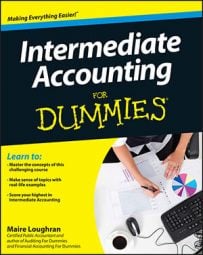An impairment loss takes place when a company makes a judgment call that the carrying value of an intangible asset on the company balance sheet is less than fair value, or what an unpressured person would pay for the asset in an open marketplace. Companies have to periodically test intangible assets to see whether there’s potential for any loss due to impairment.
If the impairment loss isn’t recoverable, under U.S. GAAP, the company has to adjust the books to reflect this lessening in value. The basic criteria for measuring recoverability centers on whether the asset’s carrying value is recoverable from its undiscounted cash flows. If it isn’t recoverable, the fair value test is used to compare the intangible asset’s fair value to its carrying amount, to measure impairment.
U.S. GAAP in Accounting Standards Codification (ASC) 360-10-35 gives financial accountants guidance on the types of events and circumstances to look for in determining whether assets have to be evaluated for recovery.
But remember, intangibles can be limited life, indefinite life, or goodwill. Each is impaired differently.
| Type of Intangible Asset | Impairment Test |
|---|---|
| Limited life | Perform the recovery test. If lacking recovery, test fair value. If fair value exceeds carrying amount, no further action is needed. Otherwise, record impairment loss for the difference between fair value and carrying value. |
| Indefinite life (except goodwill) | Test fair value. If fair value exceeds carrying amount, no
further action is needed. Otherwise, record impairment loss for the difference between fair value and carrying value. |
| Goodwill | Test fair value. If fair value exceeds carrying amount, no
further action is needed. Otherwise, compare fair value of goodwill to carrying value of goodwill. If fair value exceeds carrying amount, no further action is needed. Otherwise, record impairment loss. |

